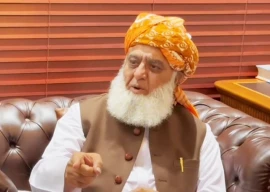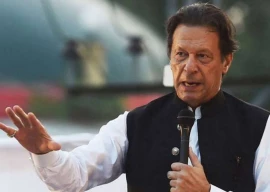
A multi-layered strategy has been developed as part of the country’s new security policy to root out extremism and militancy through military action and civilian stabilisation efforts, The Express Tribune has learnt.
The draft policy – prepared by the National Counter-Terrorism Authority (NACTA) – will be put up for discussion at a key security meeting called on July 12 in Islamabad. Leaders of major political parties and top military officials will attend the meeting.
The draft has been sent to Prime Minister Nawaz Sharif, who heads the body’s board of governors, sources told The Express Tribune on Friday. A copy of the draft has also been sent to Interior Minister Chaudhry Nisar Ali Khan.
The five layers of the national security policy are: to dismantle, to contain, to prevent, to educate and to reintegrate. It proposes that Pakistan follow China’s security model in Hong Kong and Mahathir Mohamad’s security policy in Malaysia to tackle terrorism and extremism.
Dr Mahathir, in his 22-year stint as prime minister, successfully tackled the ethnic conflict in Malaysia by pursuing economic revival in the country.
Similarly, China adopted a backburner policy for all its security-related issues, including Hong Kong. It pursued a one-point agenda by building its economic strength and changed its policy regarding its neighbours for a better economy.
The 40-page document advocates a shift from a mono-faceted approach relying on the use of force alone to a multi-layered approach addressing all dimensions of the problem at nearly all levels. It calls for reappraisal of Pakistan’s foreign policy, especially vis-à-vis its neighbours. It also suggests police reforms and review of anti-terrorism laws to rid them of lacunas.

The new policy proposes specialised counter-terrorist financing units at the provincial level and strengthening of the existing unit in the Federal Investigation Agency (FIA).
According to the policy, the ‘weak role’ Ulema (religious scholars and clerics) is another ‘environmental cause’ of terrorism and extremism in the country. The Ulema, it says, instead of keeping abreast of the fast-changing times, were preaching a centuries-old paradigm.
The policy recommends strengthening of the judicial system from the grass-roots level to ensure speedy justice. It also calls for reforms in the education sector. Curricula have to be revised and evaluated so as to screen out elements in it, if any, which promote extremist tendencies.
It envisages a structured education and awareness campaign to counter the ‘distorted version of Islam’ disseminated by terrorists, and offer a counter discourse based on Islamic values of peace and tolerance.
The new policy says that the state should devise a mechanism to reintegrate those who either leave so-called jihadi organisations or who get disengage from such acts on any account. The state can utilise former militants through dialogue and also imprisoned terrorists or other suitable strategy to do so.
The policy highlights several causes of terrorism and extremism in the country which, according to NACTA, should be addressed. These causes include 1.) Soviet invasion of Afghanistan in the 1980s and consequent developments of ‘jihadi networks’ through US assistance 2.) the spread of extremist ideology through literature, madrassas, media and other propaganda techniques, and 3.) international linkages facilitating the cause of terrorists and extremists in one way or the way.
According to Interior Minister Chaudhry Nisar Ali Khan, the national security policy will be a two-pronged: ‘operational’ and ‘strategic’ policy.
“On the operational level, the government will focus on how law-enforcement agencies should go two steps ahead to deal with terrorists who are pushing Pakistan into a blind alley,” he said. At the strategic level, the government will consider massive use of force, negotiation and strategies to deal with extremism, he added.
NACTA’s National Coordinator Syed Hyder Ali told The Express Tribune that the authority has incorporated input from national and international security experts in the new policy. “It has been tailored out through a set of six simulation exercises carried out at the four provincial capitals,” he added.
The prime minister’s adviser on national security and foreign policy Sartaj Aziz said that the premier will consult top politicians on the new policy before finalising it. “It will not be a final policy. Instead, it will be the beginning of some actions,” he told The Express Tribune.
Aziz said the National Security Policy has many dimensions because the security problems in Balochistan, Khyber-Pakhtunkhwa and Karachi are fundamentally different.
Published in The Express Tribune, July 6th, 2013.
COMMENTS (35)
Comments are moderated and generally will be posted if they are on-topic and not abusive.
For more information, please see our Comments FAQ
1724760612-0/Untitled-design-(12)1724760612-0-405x300.webp)
















Why do you have to copy foreign model? All you have to do it, put Pak army where it belongs and do not encourage terrorists.
@Pa[k]triot: Thank you my wo/man, you are just wonderful! Good job to highlight all the 'salient features' of this 'wonderful mode'l the Dictator Mahatir's brain child to crush and choke any voice of reason or dissent in his authoritarian resgime. Pakistanis would be naive to get impressed by any such ideas, we must ask this budding dictatorship here questions like what so wonderful about China or Malaysia and their brutally oppressive systems. No, we don't want to give up whatever freedoms we have got for ourselves after all the struggle and hardships. Say a laud and clear no and refuse any attempts by anyone to usurp our civil liberties, we don't wish to sell our rights. Providing safety and security to citizens is the fundamental responsibility of any government including Nawaz Sharif & Nisar Khan Associates, if they can't then perhaps it's time for the people to reconsider where we went wrong and must right it.
@Sodomite: "@Muneeb: Punjab constitutes 60% of Pakistan. Elementary Watson!"
Sodomite, Punjab is NOT where 60% of the terrorism in Pakistan is taking place. Elementary Yourself!
Yet another mindless and clueless statement by our bureaucratic and political mafia. What is the Malaysian model? Mahathir ruled that little country for 22 years as a tyrant. Under the so-called Malaysian model: trade unions are banned; student unions are banned; print and electronic media are heavily censored; Internal Security Act (ISA) is employed to silence political opposition; under the act arrests are made without warrants and detention is indefinite during which horrid brainwashing tactics are used; Shia are a banned sect in Malaysia; as a Christian you cannot preach in that country; so much so you are not allowed to use the word Allah in your publications - never mind the Arab Christians who have used it since the pre-Islamic era; media is heavily monitored and strictly regulated; money politics reigns supreme; racism is enshrined in the constitution of that country whereby Chines and Indians, the two minorities, are denied their basic rights to get government funding for education. Is Pakistan going to adopt this "model" if at all it can be called a human model?
both chinese and malaysian models are crushing-muslims..so pakistan also adopting the same models ?
Better late than never - but it's a start. Speaking of "dismantlement" - how about closing down the madrassas - one of the root causes of extremism.
"Aziz said the National Security Policy has many dimensions because the security problems in Balochistan, Khyber-Pakhtunkhwa and Karachi are fundamentally different." Well said, Aziz. Security problems being "fundamentally different" in different areas of Pakistan no single dimensional security policy is likely to work. "At the strategic level, the government will consider massive use of force, negotiation and strategies to deal with extremism, " again Baluchistan cannot be dealt with massive use of force as only a political solution is going to be effective. So all in all no piece-meal single dimensional policy is going to work. What is needed is a "Grand Strategy" which would incorporate security strategy, and integrate it with an "economic," and "political strategy."
It is not a comprehensive national security doctrine.
No, no, no! I do not like what I read hear. Security under absolute authoratarian regime, no absolute dictatorial power is a misnomer, I reject to accept this attempt at subjugation of citizenary, I refuse surrendering my civil liberties and freedom as citizen to the State authority. This no security it is complete bamboozling of our rights, Chinese or Malysian models are the worst Nisar Khan and his boss the PM could offer. This is worse than declaring himself Ameer-ul-whatever. No thank you!
@ Jibran For Sri Lankan model we need strong and bold leadership like Jaywerdhne and Chandrekha Kumaratunga.
@jibran: Yes the PTI model of "innocent Talibans".
I say put this new policy in parliament, lets see how many can read let alone understand. ... our model is corolla 86 model and thats that.
This policy is good if a new counter terrorist unit and investigative dept is made on modern lines with the help and assistance of those countries who have been able to contain this menace.....such step will give the procsecutors and judiciary the required assistance to convict these arrested terrorists, which presently are bailed out due to insufficiente evidence.....
@viv, Colonial model won't be effective, as that is a case of occupation.
yes i agree India model is better no terrorist can ever cross the Indian Army's heavy military belt in LOC.They are either captured or killed.Pakistan may dislike adopting India model in J&K but in truth it is much better model and can be applied in pakistans border with afganistan to stop terrorists entering into pakistan.
Chinese policy in Hong Kong? What militant insurgency is China facing in HK? If economics, dont they mean British policies in Hong Kong?
This is wonderful news - but can ANY model be implemented by fork-tongued politicians and intellectual pygmies ?
@Aftab: What Aftab says is the centerpiece of a National Security Policy. Pakistan can only function if a policy of accommodation and friendliness towards its neighbors is proven. The educational and religious curricula for all students must be kept up to date with the changing times. Salams
@jibran: We would be in a better position to evaluate whether the policy is mere fluff or there are tangible details supporting it, but comprehensive problem analysis is usually the first step and all such long-term solutions start with out at very high level of abstraction with details / plans added over multiple iterations.
I think that certainly makes sense as a starting point. Why do we have to re-invent the wheel when many nations have already solved these challenges before us? No model is applied to the dot in real life scenarios. The objective is to pick up the guiding framework and tailor it to your context.
Pakistan will do well to emulate India's model in Kashmir !!
@Sodomite,it was restructuring of Punjab Police on Turkish model you are confusing national security policy with provincial security concern.
Only justice and economic reforms are enough to solve this issue.
"It envisages a structured education and awareness campaign to counter the ‘distorted version of Islam’ disseminated by terrorists, and offer a counter discourse based on Islamic values of peace and tolerance."
And the saudis will allow that will they?, no, rather more funds for countering the "ahlul bidah"
Only solution is the islam thats been followed here for hundreds of years by the majority, that is Sufi (Sunni) Islam. Only that has the depth to counter such ingrained radicalization. None of this moderate nonsense is going to work at all.
The five layers of the national security policy are: to dismantle, to contain, to prevent, to educate and to reintegrate.
The question is not WHAT but HOW. seems like this policy has also been drafted by Atta ul Haq Qasmi. It plays with words but nothing concrete.
Will there ever be a pakistani model. The models cited have never been tested against extreme militancy. If you need to import a model anyway, it has to be either the Indian model or the Sri Lankan model.
So much to put Jack back into the box!!
As a citizen of Pakistan, the bottom line for me is that Government should do what ever it want to do, but peace must prevail in the country at all costs.
Before inviting an foreign company to invest in Pakistan, we must clear our mess by all means so that after one foreign company shall come to the country, the other foreign companies should follow the for suit.
This will increase employment opportunities as the youngsters of Pakistan have lost hope and due to terrorism and unemployment it has become the cire reason for the brain drain.
If all young and talented people will go out from Pakistan then on whose shoulders we will switch over responsibilities of the country to carry on?
A few days ago it was the Turkish model. Today it is Chinese and Malaysian. Tomorrow it could be the Gestapo model. Better slow down. Try to get the British model that we had working. If there is no politicization that model has worked for years. Don't reinvent the wheel.
Its great to see, if it get implemented. In addition, educational curricula certainly needs to get revise. Indeed there are deliberate ways, which inducted to promote hatred or violence.
NACTA also recommend to revise foreign policy elements of extreme elements ..
All policies work to some extent but the real thing is the will of those who are responsible for its implementation.